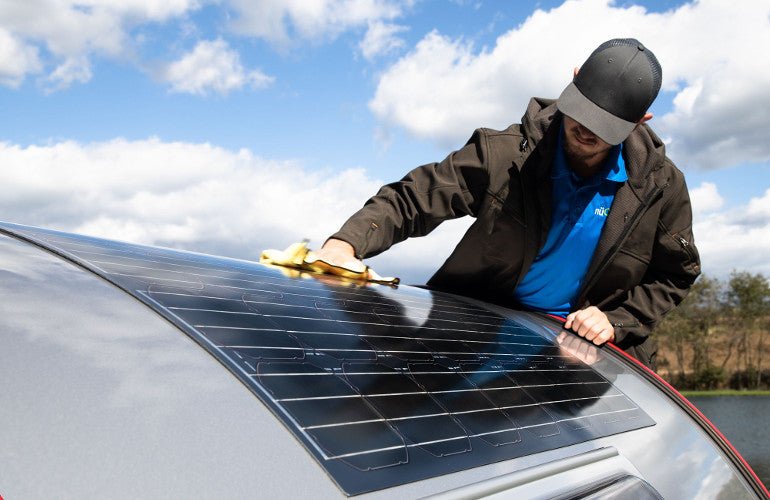Have you ever considered how to utilize solar energy in the most flexible way? This is where flexible solar panels come into play. These innovative panels are lightweight and adaptable, and are very suitable for various applications.
Due to efficiency issues, flexible solar panels are not suitable for residential power supply. Instead, they are more suitable for charging RVs on the road or even being installed on boats. Overview of flexible solar panels. So, what exactly are flexible solar panels? In short, these are thin and lightweight solar cells that can be bent and fit various surfaces. Traditional rigid solar panels are made of glass and aluminum.
Therefore, the protective layer will decompose faster, leading to faster degradation of the underlying battery. How much power can flexible solar panels generate? The average output power of flexible solar panels is usually 100 to 200 watts. In terms of efficiency, most flexible solar panels operate at an efficiency of about 15% to 20%. This is lower than the efficiency of traditional rigid solar panels.
Under similar conditions, traditional rigid solar panels can achieve an efficiency of 20% to 25% or even higher. From a practical perspective, this means that although flexible panels can generate sufficient power for small applications, they do not generate as much power as rigid panels in the same space. For example, if you have a 100-watt flexible panel and a 300-watt rigid panel, then under the same amount of sunlight, the rigid panel can generate more power. Advantages and disadvantages of flexible solar panels. Why choose? Disadvantages: Lightweight and portable. Generally low efficiency. Strong flexibility and adaptability. Shorter lifespan. Easy to install in narrow spaces. More expensive. Suitable for curved surfaces. Prone to physical damage. Advantages of flexible solar panels: Lightweight and portable: Its lightweight design makes flexible solar panels easy to transport and is very suitable for camping trips or RV trips. Flexibility and adaptability: They can adapt to various surfaces, including curved roofs or irregular shapes, thereby expanding installation options. Easy installation: The installation process is very simple. Compared with rigid panels, fewer installation materials are required. Very suitable for curved surfaces: Its flexibility enables it to be effectively installed on vehicles, ships, and other non-flat surfaces. Disadvantages of flexible solar panels: Generally low efficiency: Although they can generate sufficient power, their efficiency is often lower than that of rigid panels, which means they need a larger surface area to generate the same energy output. Shorter lifespan: The service life of flexible panels is 5 to 15 years, which is shorter than the service life of traditional panels (25 years or longer). Generally more expensive: The involved technology and materials make flexible panels more expensive than rigid panels. Prone to physical damage: Flexible panels are more easily damaged by sharp objects, impacts, or punctures. Unlike rigid panels with a solid surface, flexible panels are more easily damaged, especially under harsh conditions. The best flexible solar panels on the market. When it comes to flexible solar panels, several brands stand out for their efficiency and quality. Here are some of the most competitive brands: Renogy 100W flexible solar panel. Price: about $200. Product advantages: Known for its high efficiency (about 21%), lightweight design, and durability.It is easy to install on various surfaces and is an ideal choice for RVs and boats. SunPower 110W flexible solar panel. Price: Approximately $300. Product advantages: Provides excellent efficiency (up to 23%) and a compact size. SunPower panels are also known for their long service life and high-quality materials. ALLPOWERS 100W flexible solar panel. Price: Approximately $150. Product advantages: This option is both economical and can maintain good efficiency (about 18%). It is especially known for its flexibility and easy installation. Eco-Worthy 120W flexible solar panel. Price: Approximately $250. Product advantages: High efficiency (about 19%) and durability. Versatile and very suitable for off-grid applications. These brands are highly regarded for their performance and reliability and are an excellent choice for anyone who wants to invest in flexible solar panels. Are flexible solar panels worth it? Choosing between flexible and rigid solar panels depends on your specific needs. Flexible solar panels are especially valuable in the following situations: Limited space: If you are trying to power a small space such as a camper or boat, their adaptability allows them to be installed in narrow or curved areas. Portability needs: For people who travel frequently or need temporary power solutions, flexible panels are lightweight and easy to transport. Unconventional installation: If you want to install solar on unique surfaces such as car roofs, flexible panels are a better choice. On the other hand, rigid solar panels are a better choice in the following situations: Maximum energy output: If you have enough space and pursue higher efficiency, then rigid panels can generate more electricity. Long-term installation: For fixed applications such as residential roofs, rigid panels have a longer service life and higher durability. If you are considering rigid solar panels, our Shielden solar panel series has efficient options with both quality and performance to ensure you get the best return on investment.
